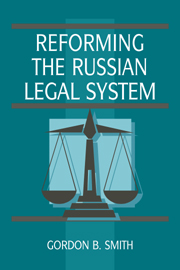Book contents
- Frontmatter
- Contents
- Preface
- 1 Pre-revolutionary Russian law
- 2 The Bolshevik experience
- 3 The history of legal reform
- 4 Forging a new constitution
- 5 Citizens and the state: the debate over the Procuracy
- 6 In search of a just system: the courts and judicial reform
- 7 Law and the transition to a market economy
- 8 Legal reform in the republics
- 9 Legal reform and the transition to democracy in Russia
- Appendix: Constitution of the Russian Federation
- Notes
- Index
2 - The Bolshevik experience
Published online by Cambridge University Press: 09 October 2009
- Frontmatter
- Contents
- Preface
- 1 Pre-revolutionary Russian law
- 2 The Bolshevik experience
- 3 The history of legal reform
- 4 Forging a new constitution
- 5 Citizens and the state: the debate over the Procuracy
- 6 In search of a just system: the courts and judicial reform
- 7 Law and the transition to a market economy
- 8 Legal reform in the republics
- 9 Legal reform and the transition to democracy in Russia
- Appendix: Constitution of the Russian Federation
- Notes
- Index
Summary
The formal law is subordinate to the law of the Revolution. There might be collisions and discrepancies between the formal commands of laws and those of the proletarian revolution… This collision must be solved only by the subordination of the formal commands of law to those of party policy.
Andrei Ya. Vyshinsky, Stalin's procurator-general (1935)The development in Russia of a modern European legal system incorporating concepts of rule of law, protection of citizens' rights vis-à-vis the state, and judicial independence was, as we have seen, hampered by a sclerotic and reactionary monarchy overwhelmed by social and political forces beyond its control. The collapse of the monarchy and the successful Bolshevik coup d'état against the Provisional Government, rather than destroying the Russian Empire, essentially enabled it to endure, albeit in a new form. For almost three-quarters of a century, power remained centralized in the hands of a few; most citizens were relegated to the status of subjects rather than real participants in political decision-making; Russians enjoyed considerable advantages not shared by other ethnic groups; and law primarily served the interests of the state rather than the individual.
As we have seen, the Russian Empire lagged behind the rest of Europe in developing a capitalist economy, a democratic political system, and a modern legal system, in part due to its physical isolation during much of the seventeenth, eighteenth and early nineteenth centuries.
- Type
- Chapter
- Information
- Reforming the Russian Legal System , pp. 27 - 52Publisher: Cambridge University PressPrint publication year: 1996

